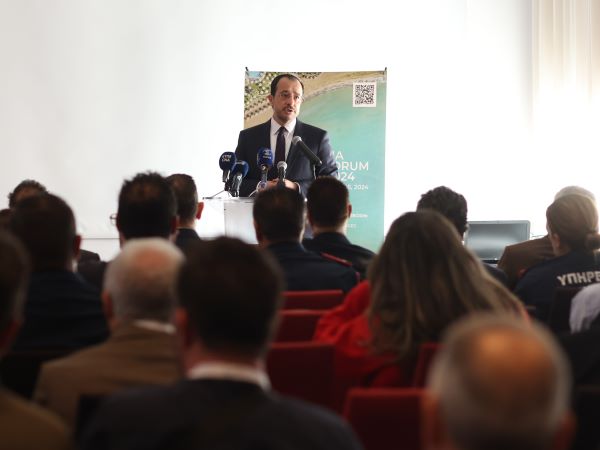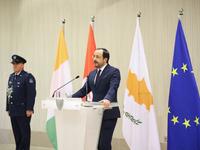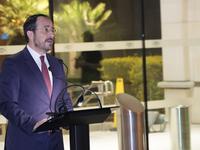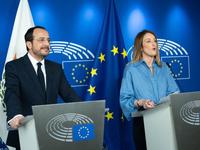Press Releases

05-12-2024 12:28
Address by the President of the Republic of Cyprus, Mr Nikos Christodoulides, at Nicosia Risk Forum 2024
Strengthening the disaster resilience of the Mediterranean region
I am exceptionally pleased to be part for yet another year of the Nicosia Risk Forum; this time in my capacity as President, but our collaboration goes back in time.
First and foremost, I wish to congratulate the Forum for its commendable work over the years. Dear George, your work has rendered the Forum into a hub of regional dialogue, and promotion of peace and collaboration in the Mediterranean, by bringing together national civil protection authorities, international organisations, regional organisations, academics, shareholders and local communities. Only in this year’s gathering, over 20 countries’ civil protection authorities are represented.
The Republic of Cyprus firmly supports the efforts of the European Union and those of the Union for the Mediterranean to promote an agenda that will support our region to face the upcoming challenges of climate change. I am very pleased to note that later today the Union for the Mediterranean’s Regional Dialogue Platform on Civil Protection will take place as part of the Risk Forum with an even broader audience.
Dear friends,
Climate change is moving with unprecedented speed. We are reaching the worst climate projections much faster than anticipated a few years ago. The recent COP29 in Baku, where I had the opportunity to present Cyprus’ position, was a step towards a positive direction, but there is much more to do. As I mentioned at Baku, extreme weather events are impacting our ecosystems, our economies, including agriculture and tourism, our communities and the quality of life of our people. They act as a stark warning and also highlight the urgent need for decisive, coordinated action that we need to take today. We need immediate, targeted responses at both the national and regional levels.
Within this context, Cyprus has taken proactive steps by implementing a National Adaptation Strategy since 2017. We are currently updating this Strategy to strengthen our capacity to manage complex and interlinked climate risks. Despite our small carbon footprint, Cyprus is committed to contributing to global emissions reduction.
At the same time, at regional level, Cyprus recently relaunched the Eastern Mediterranean and Middle East Climate Change Initiative, aiming to develop synergies to mitigate the impact of climate change with a focus on cross-border projects.
The Eastern Mediterranean, and with it Cyprus in particularly, is impacted by climate change. Wildland fires in ever increasing fire seasons and extreme weather events –in the autumn and winter– test the limits of our civil protection system. In fact, summer 2024 was probably the hottest recorded in history. Despite these conditions, 2024 was a year marked by less fires and less area burned.
Dear friends,
The Government of the Republic of Cyprus is committed and is taking action in building a brand new, robust and responsive national civil protection mechanism. This emerging issue of climate crisis requires, on the one hand, a vision to provide an inclusive societal safety net, and, on the other hand, calls for firm action.
In this respect, we are already at the transition phase of our civil defence force, moving towards becoming a modern civil protection authority that will act as a focal point and an umbrella for the first responder services established in our country. In this direction, we receive technical support from the European Commission, expecting soon to have a proposed new legislation and a new organogram.
At the same time, we have an ambitious plan to reinforce our aerial firefighting capacity by acquiring ten new aerial means. A technological enforcement program is also underway with the adoption of a “Next Generation 112” that will be our channel of two-way communication with our local communities, providing them a way to report emergencies in a comprehensive manner, and, at the same time, it will give the opportunity to our national civil protection mechanism to increase its crisis management abilities and to give lifesaving information to the wider public.
Finally, we pay emphasis to early detection of wildfires. The first testing phase of a “holistic” system has been developed, and we are currently in the phase of designing a second phase that foresees the installation of a number of long-range sensors combined with aerial detection with the use of technology, unmanned aerial vehicles (UAVs) and drones. A lesson learnt from the various crises we faced in the last decade is to invest in infrastructures, and this is what we intend to do.
Dear friends,
Civil protection grows on solidarity. Civil Protection can be a catalyst for regional collaboration. A fundamental pillar of our foreign policy is to engage with our neighbourhood. Our response to the humanitarian crisis in Gaza prompted us to formulate and together with our partners –the European Union (EU), the United Arab Emirates (UAE), the United States of America (USA), Israel, a number of Arab countries– to operationalise the Amalthea maritime corridor. Amalthea is a testament to what a small country can achieve by fostering good relations with its neighbours.
At the same time, during the recent MED9 Meeting in Pafos, given that the Mediterranean region is particularly vulnerable to the effects of climate change, including natural disasters, extreme weather conditions and desertification, we included climate change on the agenda of the discussions between EU Mediterranean member states and His Majesty the King of Jordan. To address these challenges, an enhanced regional cooperation between our region and the countries of southern Europe must be achieved, as well as an enhancement of the EU Civil Protection Mechanism and the relevant Crisis Response Funds.
Our aim is to establish our country as a hub for the provision of humanitarian support in our neighbourhood with the collaboration of the stakeholders and the European Commission. Another example of this cooperation is our plan to establish Cyprus as a hub for aerial firefighting. In summer 2024, we hosted Jordanian and Egyptian helicopters, and in the past, we hosted aerial firefighting means from Israel and Greece, among other countries. We will modernise and up our host nation support capacities.
Dear friends,
The involvement of the Arab League, the United Nations, and the continuous leadership of Union for the Mediterranean (UfM) and DG ECHO in the Nicosia Risk Forum is a testament to our joint commitment in promoting the values of civil protection in the Mediterranean and the greater Middle East. Natural disasters know no borders. Our common future is based on understanding that we are much better off united against the effects of climate change. Joining powers with a sense of urgency is our primary aim.
Thank you very much.
(RM/AP/GS)
Relevant Press Releases







